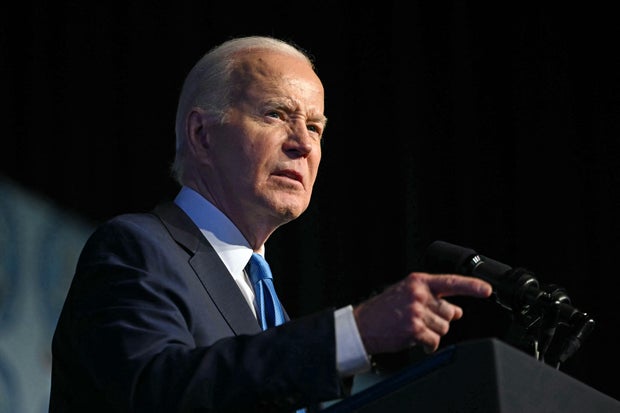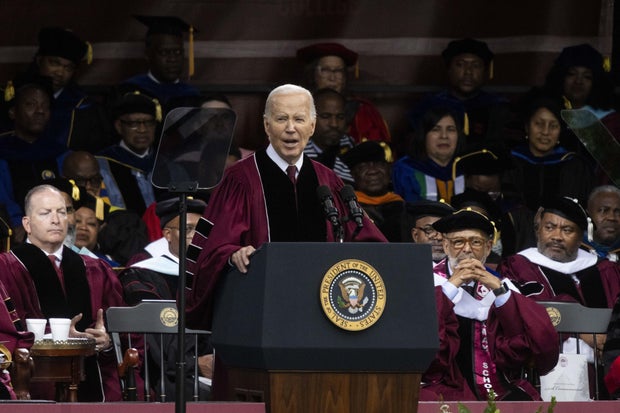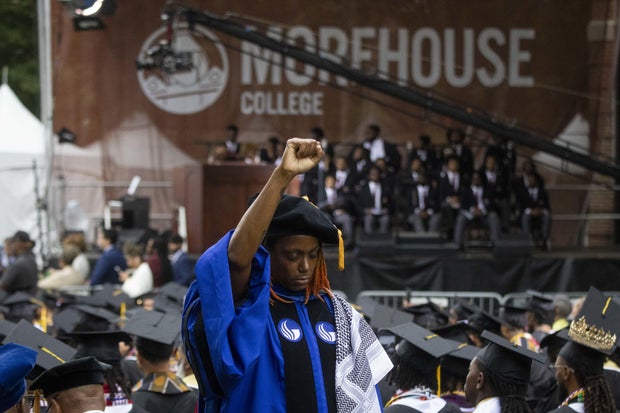President Biden addresses Black voters in Georgia and Michigan, emphasizing his record and contrasting his administration’s policies with those of Trump. At Morehouse College, he discusses democracy and the Gaza conflict. Protests highlight concerns over U.S. foreign policy.
Atlanta and Detroit — President Biden began his address at the National Association for the Advancement of Colored People’s “Fight for Freedom Fund” dinner in Detroit Sunday by declaring himself a “lifetime member” of the NAACP.
Earlier in the day, several states farther south, in Atlanta, Mr. Biden began his Sunday morning commencement address at Morehouse College — a historically Black liberal arts college for men — with scripture.
“Scripture says the prayers of a righteous man availeth much,” the president said in Atlanta, as he went on to tell the story of Reverend Richard C. Coulter, a former slave from Atlanta who helped create Morehouse College.
“You all know the story, but the rest of the world doesn’t, and it should,” he added.
ANDREW CABALLERO-REYNOLDS / AFP via Getty Images
The weekend swing through Georgia and Michigan, where Mr. Biden made direct overtures to large crowds of Black voters, came as the campaign is looking to revitalize his support with Black voters in the face of lagging polling numbers and with less than six months before the election.
The Biden campaign says it has invested more than $1 million in targeted ad buys on Black-owned media this month and has prioritized interviews on Black radio. But while the president still registers overwhelming support from Black voters in polling, his backing in that crucial voting bloc has softened slightly.
In a March CBS News poll in Georgia, 82% of Black voters said they’d vote for Mr. Biden, compared to 88% in a 2020 exit poll. In an April CBS News poll in Michigan, Mr. Biden got support from 77% of Black voters, with other third party options on the ballot.
Biden touts record for Black voters, taunts Trump in Detroit
Throughout his closing events in Detroit — a campaign stop at a Black-owned business and the speech at the NAACP dinner — Mr. Biden made sure to lay out his record for Black voters.
He brought up the $16 billion his administration has invested in historically Black colleges and universities, the low rate of Black unemployment, his efforts to lower the price of prescription drugs and actions on relieving student debt.
“I’ve forgiven an awful lot of debt from the folks who have college debt — and billions of dollars of it — so people can start their lives again,” he said at the CRED Café in Detroit on Sunday afternoon.
“The guy we’re running against wants to back up all the prospects, all the progress we made,” he added, referencing Donald Trump, the presumptive Republican presidential nominee and former president..
Sonya Ellis, a 69-year-old teacher from Detroit who saw Mr. Biden speak at the NAACP dinner, said she got her student loans excused because of his policies. But she said she was “very nervous” that Trump could win in November and felt Mr. Biden could be stronger on foreign policy.
“I think Trump voters are going to vote. I know people who are Democratic, who say they aren’t going to vote,” she said.
Throughout the weekend, Mr. Biden thanked Black voters for helping him win in 2020, and said they would be the reason Trump “is going to be a loser again.”
During his NAACP speech, Biden leaned into contrasts setting him apart from Trump for Black voters. After he touted his appointment of Kentaji Brown Jackson as the first Black woman on the U.S. Supreme Court, Mr. Biden asked the NAACP dinner crowd of over 4,600 attendees if Trump won a second term, “Who do you think he’ll put on the Supreme Court? You think he’ll put anybody who has a brain?”
Later on, while noting how Trump has said he would pardon convicted January 6 rioters, Mr. Biden asked the crowd to consider a hypothetical.
“What do you think he would have done on January 6 if Black Americans had stormed the Capitol?” Biden said, to numerous groans in agreement.
Robert Oscar Williams, a 49-year-old Black voter who saw Mr. Biden’s remarks in Detroit, believed that while the president made his administration’s record clear, he wanted to have heard more about plans for a second term.
“More people want to hear tangibles. They want to know, ‘What am I going to get for my vote?’ Not just a good speech,” said Oscar Williams.
“The Black vote cemented him the win last (time). It would be unintelligent not to speak to that vote,” he added.
At Morehouse, Biden says his heart is “broken” over Gaza
During his commencement address at Morehouse College, Mr. Biden often brought up the topics of struggle, faith and democracy.
He tied restrictive voter laws and attacks on election workers to “what happens to you and your family when old ghosts in new garments seize power.” He repeatedly questioned whether American democracy “actually works” for Black citizens.
“What is democracy, if a trail of broken promises still leave Black communities behind?” Mr. Biden asked.
Christian Monterrosa / Bloomberg via Getty Images
Later in his remarks, he returned to that question to talk about Gaza.
“I also know some of you ask: ‘What is democracy if we can’t stop wars that break out and break our hearts?'” Mr. Biden observed. He went on to say what’s “happening in Gaza and Israel is heartbreaking,” calling it “one of the hardest, most complicated problems in the world,” and called for a two state solution and an immediate ceasefire — which got notable applause.
The Israeli military operation in Gaza, which the Hamas-run Gaza Health Ministry says has killed more than 34,000, has spurred numerous college “encampments” and protests, as well as interruptions at commencement events. While there was a protest outside the Morehouse campus, there were no major interruptions during Mr. Biden’s address.
Instead, protesters took quieter approaches: Some students turned their chairs the other way with their backs facing the president, while others adorned Palestinian flags or scarves over their graduation robes. And throughout Mr. Biden’s speech, professors on stage held up a flag of the Democratic Republic of Congo, to voice discontent with the administration’s response to that country’s civil war.
Christian Monterrosa / Bloomberg via Getty Images
Yolanda Hutchins, a 55-year-old Democratic voter in Atlanta, said Mr. Biden is “pissing a lot of people off right now with what’s going on with the genocide in Palestine.”
“It’s something I hear about daily. I hear about it on social media. I talk about it and discuss it with family and friends,” she said.
Pro-Palestinian protestors were also present outside the NAACP dinner in Detroit. Bill Osborne, a 64-year-old Democratic Detroit resident, said he believed Gaza resonates most with Arab Americans and younger Black voters who “decry the injustice they believe Israel is inflicting upon Gaza.”
“But if you looked out at the protestors outside, there weren’t a lot of Black protestors. I wouldn’t say it’s a make-or-break issue for Black voters; I think it’s more so the alienation they may feel,” he said.


